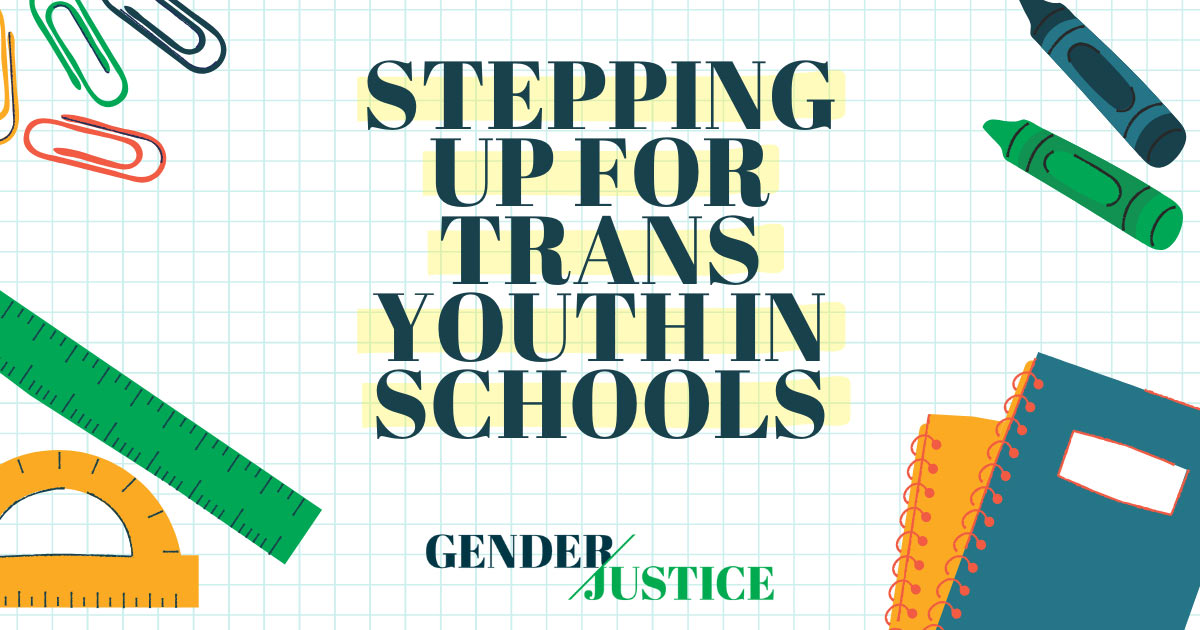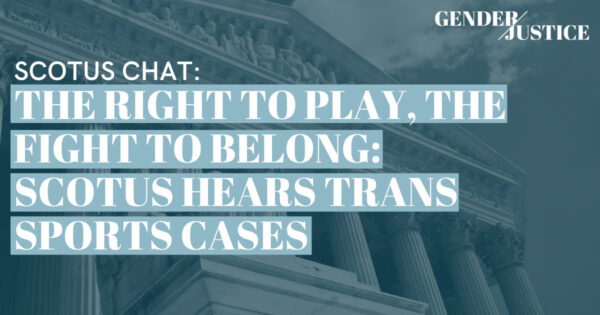
In a special Trans Equity Training this fall, special guest speaker Rebecca Allen — a community leader, recent graduate from the University of Minnesota’s Master of Public Affairs Program, and a proud parent of two — shared her research on best practices for schools to support trans and non-binary students.
We know that trans and non-binary kids are facing high levels of discrimination at school — 80% of trans and non-binary students have heard negative comments about transgender people and 1 in 3 have been physically threatened or harmed. These are incredibly scary statistics, but we are not helpless or hopeless — there are concrete steps we can take to make schools safe and affirming places for all students.
While Allen’s research focused on kids and families from Minneapolis Public Schools, she shared insights that can apply to any school environment:
Anti-bullying Policies: Having policies that explicitly protect gender identity and expression, and punish discriminatory behavior, is the most basic level of necessary support. It’s also required under Minnesota law (Learn more). While critical, this level of support has limitations — it helps prevent specific instances of discrimination, but it does not address the root causes.
Accommodations: The next level of support involves providing affirmation for trans and non-binary students. Examples include respecting pronoun and name changes, and providing access to programming that is consistent with a student’s gender identity. Unfortunately, students and their families often have to take the lead in asking for accommodations, forcing kids to “out” themselves in order to be treated with basic respect and care. Minnesota law protects students’ rights to participate in school activities and use the bathroom that aligns with their gender identity (Learn more).
Culture Change: Schools can reach this highest level of support by taking full responsibility for creating a safe and welcoming environment for all students…sounds like common sense, doesn’t it?!? This can look like requiring training for all staff and ensuring that the school curriculum itself is gender-expansive, meaning that the curriculum content itself challenges and expands beyond binary notions of gender. Currently only four states — California, Colorado, Illinois, and New Jersey — have gender-expansive curriculum requirements.
To be truly nurturing spaces for all students, every school should aim for culture change — but unfortunately, many schools are failing trans and non-binary kids at the most basic level. When this happens, the consequences can be devastating.
“It felt like a betrayal, like these people are supposed to stand up for us, and they’re just acting as if they don’t see things,” said one parent Allen spoke with during her research, sharing their 7th graders’ response to educator inaction in the face of anti-trans bullying. “Especially with the climate that we’re living in right now, we need people to speak up.”
Luckily, we know exactly what is required of us to keep trans and non-binary students safe and affirmed at school: common sense support systems that will benefit not just gender-expansive youth, but all young people. Said Allen, “my hope is that by sharing their stories with you tonight and my findings, we can start to make schools a place where trans and non-binary youth can thrive because of their schools instead of despite their schools.”
Resources
- Check out our Supporting LGBTQ+ Students at School toolkit, which includes Know Your Rights information and additional resources for students and families in Minnesota.
- Gender Inclusive Schools provides parent and educator training and general resources aimed at creating safe learning environments for LGBTQ+ youth.
- Read Rebecca Allen’s full report, “Gender Inclusive School Policy: Best Practices vs. In Practice at Minneapolis Public Schools.”
Take Action
- Check if you have a school board election this year! Election Day is Tuesday, November 4, 2025.
- Raise your voice: post on socials, get in touch with your school board representatives, and/or write a letter to the editor to show your support for trans inclusion and equity.
- Attend a future Gender Justice Trans Equity Training to get more tools for taking action!
Recent Commentary
- The Title IX Fight Isn’t Just About Sports. It’s About Civil Rights.
- SCOTUS Hears Trans Sports Cases
- Three Things to Know About the Landmark Cooper v. USA Powerlifting Win
- Why the ERA Can’t Wait: Voices from the Minnesotans for Equal Rights Coalition
- Fall 2025 Newsletter & Annual Report
- Anti-LGBTQ+ Censorship in Public Schools
- Skrmetti’s Impact on Gender-Affirming Care in MN & ND
- Spotlight: How to Have Meaningful Conversations on Trans Rights
- The People’s Session: North Dakotans Chart Their Own Path
- The Real Priorities of North Dakotans Are Being Ignored
Learn more about the topics on this page
Related Content

The Title IX Fight Isn’t Just About Sports. It’s About Civil Rights.
Across the country — including at the U.S. Supreme Court — courts are being asked whether Title IX protections extend to transgender students. And with those cases, a dangerous lie is being repeated: that Title IX requires schools to exclude trans women and girls in order to “protect” girls’ sports. That’s false. Legally, historically, and constitutionally.

SCOTUS Hears Trans Sports Cases
On January 13, 2025, the U.S. Supreme Court heard oral arguments in two pivotal cases about transgender students’ right to participate in school sports: Little v. Hecox (Idaho) and West Virginia v. B.P.J. At the heart of both cases is the question of whether state laws that ban transgender girls from playing on girls’ sports teams violate either Title IX or the Equal Protection Clause of the U.S. Constitution.

Three Things to Know About the Landmark Cooper v. USA Powerlifting Win
On October 22, 2025, the Minnesota Supreme Court issued a historic, unanimous decision in Cooper v. USA Powerlifting. This ruling not only powerfully asserted the rights of transgender athletes to fully participate in sports, it explicitly affirmed transgender Minnesotans’ dignity and place in our state. We invited community members to a briefing breaking down this landmark decision and its impact.

Milestones of Progress
Our organization has celebrated some big wins over the years and we continue to grow in the ways we harness strategic impact litigation, legislative advocacy, and education to push the law forward when it comes to gender equality. Check out what we’ve accomplished, together.